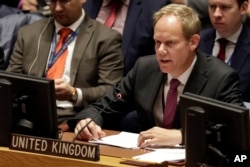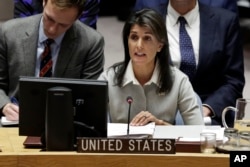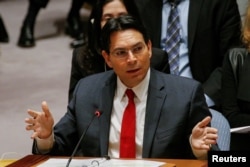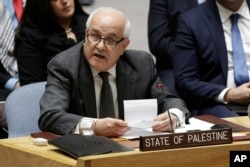Some of the United States' oldest allies turned their backs on Washington's decision to recognize Jerusalem as Israel's capital and relocate its embassy there, during an emergency meeting of the U.N. Security Council on Friday.
"It contradicts international law and U.N. Security Council resolutions," Swedish Ambassador Olof Skoog told the council. "Jerusalem is a final status issue and can therefore only be resolved through negotiations agreed between the parties."
Skoog noted that in 1947, the year before the state of Israel was established, the United Nations attributed special legal status as corpus separatum or a "separated body" to the city, which is holy to Jews, Muslims and Christians.
1980 decision
Until now, states have respected a 1980 council decision declaring attempts to change the status of Jerusalem as "null and void" and calling on all states to withdraw their diplomatic missions from the city.
British Ambassador Matthew Rycroft said Jerusalem should ultimately be the shared capital of the Israeli and Palestinian states after a negotiated settlement.
"We therefore disagree with the U.S. decision to move its embassy to Jerusalem and unilaterally to recognize Jerusalem as the capital of Israel before a final status agreement," Rycroft said. "These decisions are unhelpful to the prospects for peace in the region, an aim I know all of us in the council remain committed to."
More than half the council's 15 members requested the open meeting, and delegations from other member states packed the chamber, indicating the importance Jerusalem's status holds across the globe.
Security Council members criticized the Trump administration decision, saying it risks prejudging the outcome of final status issues and threatens the entire peace process. They also expressed concerns it could be exploited by extremists and radicals, fueling tensions in an already turbulent region.
"This carries the risk of taking a political conflict — which in and of itself carries risks — causing it to morph into an insurmountable religious conflict," warned French envoy François Delattre.
Egypt, under the leadership of Abdel-Fattah el-Sissi, has developed a close relationship with the Trump administration, but the two have diverging views on this issue.
"This is a dangerous precedent that needs reflection," cautioned Egyptian envoy Amr Aboulatta. "Such a unilateral decision is a violation of international legitimacy and thus, it has no impact on the legal status of the city of Jerusalem, since it is a city under occupation," he added.
Israel annexed East Jerusalem after the 1967 war.
Rare rebuke
In a rare rebuke of the United States, the four European council members — Britain, France, Italy and Sweden — with Germany, read a joint statement to reporters after the meeting, reinforcing their disagreement with the Trump administration position and stating the move runs counter to security council resolutions and is unhelpful to the pursuit of peace.
During Friday's council meeting, U.S. Ambassador Nikki Haley was defiant. A staunch ally of Israel, she first took aim at the U.N.
"Over many years, the United Nations has outrageously been [one] of the world's foremost centers of hostility toward Israel," Haley said. "The U.N. has done much more to damage the prospects for Middle East peace than to advance them. We will not be a party to that."
She defended the president's decision to recognize Jerusalem as the capital of Israel, saying it is the "will of the American people" and is merely recognizing the reality on the ground.
"The United States has not taken a position on boundaries or borders," she said. "The specific dimensions of sovereignty over Jerusalem are still to be decided by the Israelis and the Palestinians in negotiations."
She said the president supports maintaining the status quo at holy sites.
"We remain committed to achieving a lasting peace agreement," Haley added. "We support a two-state solution if agreed to by the parties."
'Reality check'
Israel's envoy Danny Danon welcomed the U.S. announcement saying it should serve as a "reality check" for the Palestinians and other nations.
"They can realize what's always been true: that recognizing Jerusalem as Israel's capital is a critical and necessary step for peace," Danon said. "They can learn that there will never be peace without Jerusalem as the capital of Israel."
Palestinian envoy Riyad Mansour said the U.S. announcement was "extremely regrettable," has heightened tensions and risks completely destabilizing the situation. He referred to several U.N. resolutions protecting Jerusalem's status.
"No policy announcement can change that reality, nor can it negate the rights of the Palestinian people, per international law and the relevant U.N. resolutions," he said.
Mansour told reporters that following meetings of the Arab League ministers Saturday in Cairo and next Wednesday of the Organization of the Islamic Conference in Istanbul, he would return to the Security Council to ask members to adopt a resolution asking the U.S. to rescind its decision and to reaffirm the special status of Jerusalem.
The United States would certainly veto such a resolution, but politically the move could further internationally isolate the Trump administration.








